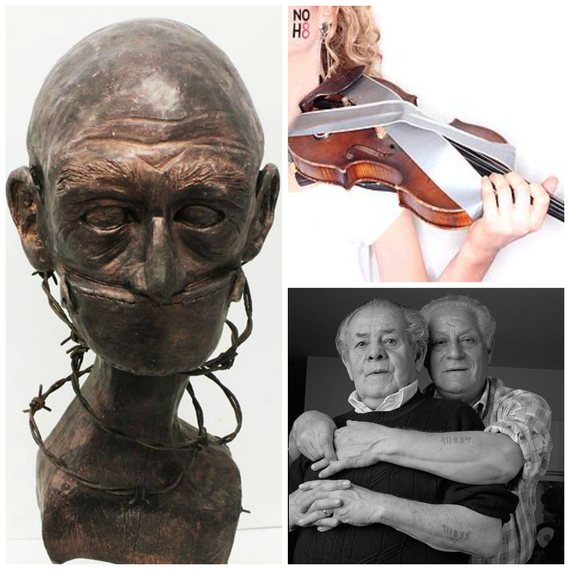Coinciding with the 70th anniversary of the liberation of Auschwitz Birkenau and seven decades after the end of the Second World War, I was humbled to take part in this year's United Nations Holocaust Memorial Ceremony at the United Nations headquarters' General Assembly Hall, New York City, with two violin performances of my original compositions dedicated to Holocaust remembrance.
During the ceremony, while listening to the moving words of United Nations Secretary-General Ban Ki-Moon, Israeli President Mr. Reuven Rivlin and Holocaust survivor Mrs. Jona Laks, I thought to myself: in this world where the final survivors of the Holocaust are aging and dying off, where the youngest person to live through the horror of the Holocaust from Oskar Schindler's list is now 76, who would be left to tell the story to the younger generations?
I founded the Gedenk Movement eight years ago because I discovered the urgent need to expand youth education about the Holocaust in order to promote tolerance. As a third generation to Holocaust survivors, I was appalled by studies showing that 50 present of kids graduating high school in America don't even know what the Holocaust is. What's even more concerning is the fact that the young generation doesn't think that the Holocaust is "relevant" to their lives.
I realized that in order to promote awareness to the young generation, one must realize that history repeats itself and although the world has been making significant progress in so many fields, we have been repeating the same mistakes and even if the time and manner are very different, the principles and values remain the same.
The Holocaust did not start with a massive act of genocide, it started with different forms of hatred, bigotry, racism and prejudice that threw societies out of balance. The Holocaust started with a philosophical idea that there are human races that are superior or inferior to others. In the hierarchy of Nazi racism, the "Aryans" claimed to be the superior race, with a need to execute racial and ethnic cleansing of anything that was different.
As the world continues to move forward, discrimination and racism unfortunately have not disappeared from the face of the earth; on the contrary, they exist and even rule some parts of our world. Any society that does not practice tolerance has the potential to become a racist society and unfortunately there are so many examples to those "out of balance" societies in our word today.
The United States was recently put to the test with Michael Brown and Eric Garner's deaths, the highly visible failure to indict the officers who killed them exposed the lack of tolerance that is still a part of the system and our lives.
Terror, which is the extreme opposite of tolerance, is one of the biggest world challenges we are facing as a global community, using violence to create fear to accomplish a religious, political, or ideological goal. The jihadist group ISIS for example, has been capturing territories by rounding up and executing anyone who resists its domination.
If "tolerance" is the opposite of discrimination, racism and terrorism, then it is indeed a terrifying thought to imagine a world without tolerance!
We have today a glimpse of a world without tolerance in the wake of repeated radical Islamic terrorism attacks, racism, anti-Semitism, hate crime, injustice and even genocides.
Those barbaric acts have brought thousands of people marching for action, in protest and solidarity. The latest headlines of growing unchecked racism and anti-Semitism from around the world, caused some who have means to move or be cautious of openly expressing their faith. Our advanced and modern world today is echoing history from a time not so long ago, a disgrace to humanity. To see the recurrence of history, so vivid across our news media, so prevalent yet again in Europe signifies a critical lack of accurate historical representation in our global community's culture and education.
In my performance introduction at the United Nations Ceremony, I mentioned that the violin is an instrument that represents the Jewish ghetto, soul, and spirit, and playing it helps me connect the past, present and future. Having a creative approach to the critical value of promoting tolerance to the young generation, "The Gedenk Award for Tolerance" in partnership with Scholastic Art and Writing Award, asked middle and high school students to create original works of art or writing that reflect upon the lessons learned from the Holocaust and other genocides. Encouraging kids to utilize various cultural outlets, such as music, art and poetry as self-expression helped engaging the young generation to raise awareness of the importance of increasing tolerance to safeguard a peaceful society.
The incredible amount of submissions and quality of work in the first and second years of this creative campaign showed us how passionate the young generation could become when realizing that they hold a crucial role in the future safeguard against human tragedy and that this role is reliant on their understanding and knowledge of history. In a time when they are inundated with horrifying images of terror; we must learn from the lessons of history.
Photo Credits: Left:"2014 Gedenk Award for Tolerance "Scholastic Art & Writing student winner Laura Fennessy "1942″, Top right: photographer Nick Calzo, Top left: NOH8 Miri Ben-Ari photo campaign

